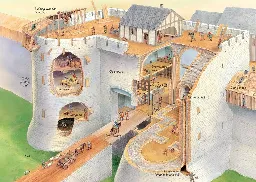Is that transported water, or well-behaved rain?
It’s rain. The Roman roofs were designed to allow rain water to fall into a pool in the middle of the atrium. These pools were connected to other pools in other houses, allowing for water to flow to houses that didn’t have atriums, bringing fresh water to the entire town.
Funny enough, I’m a big Romaboo but have never heard of this 'til now! (or if I had, I’d long-since forgotten) The more you know!
I saw these in the Herculaneum in Naples, though there the roofs were slanted towards the opening to capture more rain. You could follow a few of the sluces through the town so you could see how they were connected.
Love it. Although I imagine most rainy days would have more wind, so you’d have to stand farther away than these ladies.
I’ve been to Naples a couple times recently, and from my experience, rain in the summer is usually a sudden downpour, lasts no more than 20 minutes, drops a lot of rain at once and then it’s sunny again. I didn’t experience much wind beyond it being a bit gusty during the rain, but inside one of these houses, they’d be fine. It’ll still be 35°C or more, so a little light splashing would’ve been welcomed.
What about winter? Would they be able to cover it in extremely cold weather??
Southern Italy doesn’t really have cold weather, especially pre-industrial. It’s very temperate.
… I actually think it might be a formatting error or something, lol. Some other versions of the painting don’t have the water effect in the middle
I guess those were painted on sunny days


